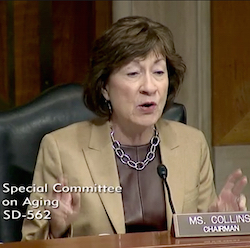
Cases of financial exploitation of older adults by their legal guardians, including cases indirectly involving assisted living communities, “highlight shocking breaches of trust by people who obtained positions of power or influence over vulnerable seniors,” Sen. Susan Collins (R-ME), chairman of the Senate Special Committee on Aging, said Wednesday at a hearing on the topic.
Connections to assisted living communities were mentioned by Collins and one of the hearing witnesses.
The senator recounted a story published in the New Yorker last year about how a woman obtained guardianship over an older couple, unbeknownst to their daughter, after she “allegedly showed up at the house … and informed them that she had an order from the local court to ‘remove’ them from their home, and that she would be taking them to an assisted living facility.”
The guardian, April Parks, “allegedly sold their belongings and transferred their savings into an account in her own name,” Collins said. Parks, who was the guardian of more than 400 people over 12 years, later was indicted on more than 200 felony charges.
Collins also shared a case from her home state. In that case, a pastor who volunteered at an assisted living community befriended a resident there.
“According to police, the state determined the woman to be incapacitated and assigned her a guardian and a conservator. The pastor allegedly took the woman to her bank, withdrew money to have the locks changed on her former home, which had been on the market, and took down the ‘for sale’ sign,” Collins said. “The police say that the pastor told the woman that he would help her return to her home, even though it was not equipped for the wheelchair access she required. He suggested his daughter could live with the woman to care for her.
“Police said that his goal was to ingratiate himself and have access to this woman’s financial accounts and property,” the senator continued. “Fortunately, in this case, the conservator, who was legally responsible for protecting the woman’s assets, identified and reported the suspected criminal activity to the police.”
The pastor was charged with exploiting an incapacitated elderly woman, Collins said.
Witness Pamela Teaster, a professor and director of the Center for Gerontology at Virginia Tech, shared a positive story of a guardian that involved an assisted living community.
“In 2016, the Virginia Public Guardian & Conservator Program was asked to serve as guardian for a patient at a mental health institute and began visiting him to get to know him in anticipation of becoming his guardian,” she said. “Upon appointment, he was moved to an assisted living facility. The public guardian program employee had monthly visits with the individual and oversaw his medical treatment and benefits. Through working with him, the public guardian realized that he was capable of managing his own affairs and that he should be restored to capacity. The program secured a new capacity assessment for the individual, including an attorney to bring a restoration of rights proceeding on his behalf. Less than two years after the appointment of the public guardian, a Virginia Circuit Court judge restored the individual to capacity, remarking that it was the first time that she had ever restored an individual to capacity.”
Data needed
Efforts to improve the guardianship system have been hampered by a lack of data, said Teaster, one of four hearing witnesses. She recommended that reforms “take the form of greater clarity and training when persons assume the role of guardians.”
Indeed, more data are needed to solve issues related to guardianship, Sen. Bob Casey (D-PA), ranking member of the Senate Aging Committee, said in his opening remarks.
“We don’t even have basic data on guardianship itself,” he said. “We don’t know how many people are subject to guardianship, who their guardians are, if a guardian has been thoroughly vetted and how many people are possibly being abused or neglected by their guardians. We should be able to agree that finding answers to these questions is the least we can do to protect our loved ones.”
David Slayton, executive director of the Texas Judicial Council, said that last year, the state passed legislation to create a statewide registration system and database that will require all guardians to register, complete an online training course and undergo a criminal background check. The 50,748 active guardianship cases in the Lone Star State are valued at as much as $5 billion, he said.
Watch the hearing here.



